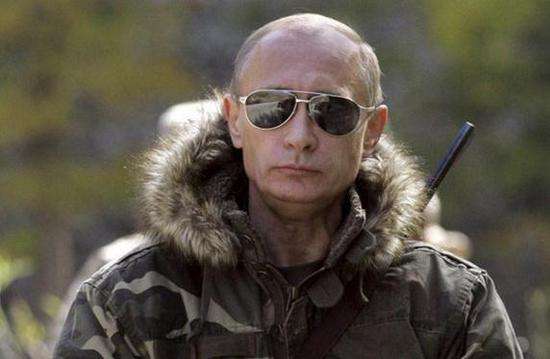(单词翻译:单击)
Vladimir Putin has been ruling Russia since 1999.
弗拉基米尔普京自1999年以来一直执掌俄罗斯。
In that time he's shaped the country into an authoritarian and militaristic society.
在这段时间里,他把这个国家塑造成了一个专治的军国主义社会。
He successfully invaded two of Russia's neighbors and strengthened ties with Syria and Iran.
他不仅入侵俄罗斯的两个邻国,同时增进与叙利亚及伊朗的关系,
He's intent on pushing back against the Western world order...
他还一心想推翻西方世界的秩序......
and it appears to be working.
而且似乎已见成效。
Vladimir Putin, 17 years in power. The most powerful man in the world
“弗拉基米尔·普京,执政17年,世界上权力最大的人。”
To understand how one man could have such a powerful influence on his country,
要理解一个人如何能够对他的国家产生如此强大的影响力,
you need to go back to the chaos and corruption that gripped Russia after the fall of the Soviet Union.
我们还需要回顾一下苏联解体后那个混乱而腐败的俄罗斯时代。
When the Berlin walll fell, a 40 year old Putin was working as an undercover spy in East Germany for the Soviet security agency the KGB.
柏林墙倒塌时,身为苏联安全机构克格勃的间谍,40岁的普京正在东德卧底。
The Soviet Union dissolved into 15 new countries, including the new Russian Federation.
苏联解散,分裂成了包括新俄罗斯联邦在内的15个新国家。
In Putin's eyes, Russia had just lost two million square miles of territory.
在普京看来,俄罗斯刚刚失去了200万平方英里的领土。
He later called this a major geopolitical disaster of the century.
他后来称这是俄罗斯本世纪一次重大的地缘政治灾难,
Lamenting that tens of millions of his co-patriots found themselves outside Russian territory.
并未千万爱国同胞被划分到了俄罗斯之外的地区惋惜不已。
The new government had to sell off nearly 45,000 public businesses like energy, mining, and communication companies
新政府不得不出售包括能源,矿业和通讯公司在内的近4.5万个公共企业,
that had been run by the communist regime.
这些企业原本都是共产党亲自管理的。
And it was chaos.
彼时的俄罗斯一片混乱。
The Russian economy was in a freefall and all these companies ended up in the hands of a few extremely wealthy men, known today as Russia's oligarchs.
俄罗斯经济自由落体,所有这些公司最终都落到了少数富可敌国的有钱人,也就是如今那些寡头手里。
At the same time the new Russian state was having a hard time establishing itself.
与此同时,这个新俄罗斯正艰难地塑造自己的形象。
Russia's first president Boris Yeltsin was wildly unpopular for cooperating with the west.
俄罗斯第一任总统鲍里斯·叶利钦因为和西方合作在国内极不受欢迎。
And to make matters worse he was an alcoholic and many Russians thought he was an embarrassment.
更糟糕的是,他还酗酒,许多俄罗斯人都以他为耻。
In order to stay in power, he leaned on the support of these oligarchs, surrendering an immense amount of political power to them.
为了继续把持政权,他倒向了这些寡头,为此向他们交出了大量政权。
This graph shows how inequality actually worsened after the fall of the Soviet Union.
这张图显示了苏联解体后俄罗斯的不平等问题如何恶化。
This is where Vladimir Putin enters politics.
弗拉基米尔·普京就是此时涉足政界的。
He leaves the KGB in 1991 and becomes the deputy mayor of St. Petersburg.
1991年,普京离开克格勃,当上了圣彼得堡副市长。
Putin uses his position to give special treatment to friends and allies in the private sector.
普京利用职位之便,在私营部门给其朋友和盟友大开方便之门:
He helps them structure monopolies and regulates their competitors, quickly becoming a favorite among the oligarchs.
帮他们实现垄断,同时监管竞争对手,很快就成了寡头中的红人。
Before long, he's assembled a support network of oligarchs, crime bosses, and security officials, mostly fellow former KGB officers like he was.
不久之后,他就拉拢了一批寡头、罪犯首领以及安全官员,其中大部分都和他一样是前克格勃。
With their help he rapidly ascends to the upper echelon of the new Russian state.
有了他们的帮衬,普京迅速窜入了新俄罗斯的领导阶层。
In 1999, president Boris Yeltsin appoints Putin, still relatively unknown in national politics, to be the prime minister.
1999年,总统鲍里斯·叶利钦任命普京为俄罗斯总理,尽管彼时普京对国家政治还相对陌生。
A fierce nationalist, Putin feared Yeltsin was letting the US dominate Russia
作为一名激进的民族主义者,普京害怕叶利钦让美国主宰俄罗斯,
and that NATO, the alliance that worked for decades to contain Soviet influence, would expand into the new liberated countries and surround Russia.
同时他也害怕北约这个数十年来遏制苏联影响里的联盟会渗入新解放的那些国家,对俄罗斯形成包围之势。
Putin's goal then became to build a strong Russian state, one that would be both stable at home and capable of exercising more influence over its neighbors.
于是,普京立志建立一个强大的俄罗斯国家,一个内部稳定同时能够对邻国施加更大影响力的俄罗斯国家。
And he quickly got his chance...
很快,他的机会来了...


